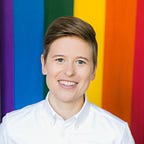Queer Grief
To grieve is human. We face losses and the big ones change us. The loss of my wife’s grandad hit me hard and we leaned into our family of friends. Poet Andrea Gibson writes, “It’s the most tender part of queerness — how we’ve all lost so much family, when we find people we call family, we’ll do almost anything to not let go.”
Grieving is hard and queer people have had lots of practice. It’s harder on your own, when others don’t understand or recognize the reasons for it. To feel alone even when you’re not having an isolated experience is part of both grief and queerness. I’ve done so much grieving I’ve started to wonder if these personal experiences have a systemic aspect to them.
His name was Dimitri Ivanovich Shurinov. It’s a miracle I even got to meet him. You, Barbara Erochina, are my wife since July 8th, 2017. We had no parents or grandparents at our wedding. We’ve been together for more than 8 years. Your grandad was the first person in our families to die in our time together. He was your maternal grandfather, who you called your grandad in English but more often called dedul in your Russian mother tongue. Your grandad came to Canada from Moscow in 2015 after his wife died. He didn’t know you were gay. He knew me only as your roommate.
On February 18th, 2020, the night before he died, he called while you were making us dinner. You told him you were cooking and that the cat was just in from a walk. I could hear the happiness in your voice. He loved cats too. You were telling him in Russian that you were content, having an average evening, and I knew I was part of that by washing the dishes beside you. But it hit me: The violence of the erasure of love.
He would never know that I was part of that happy moment in time, of a string of moments of loving you fiercely for 8 years and counting. He once asked if your roommate from your last apartment across the street had moved with you. It felt too close, you said no. Same cat, different roommate. He would never know me. He would never know how loved you were. I began to weep. I dried my hands from washing the dishes, I had to sit down. You muted your conversation and asked if I needed you. Thank goodness I said no. I cried feeling the full impact of that realization, quiet enough in the adjacent living room. I let the tears come.
Queer tears. Tears of feeling so alone. I know I am not alone. I know intellectually, that I am part of a long lineage of queer, trans, lesbian, bi, and gay partners across many parts of the world where our love is erased, made invisible, and means nothing about belonging to our families. It does mean that we don’t belong in many spaces.
Queerness is a mark of difference. I’m going through what generations of queers have experienced before me. But isolation happens from the dominant culture through our families of origin, our workplaces, through colleagues, and extended family. We’re overlooked. Our love is treated as less than. I know I’m not alone in this but it’s still a rocky experience: I feel sad and angry and powerless in turn. This takes its toll on us. All those real and intangible losses add up.
When we got the news the next morning, you cry. He had had breakfast and gone back to bed and died of a heart attack. You had heard it in his breathing the night before. We took turns being sad before the funeral. I wondered where my time and place to grieve was. You couldn’t understand why I was upset. After all, he was your grandfather and not even your straight sister-in-law or the great grand-kids were invited to the funeral. It was only you, your brother, your mom and dad. A service with incense, led by the Russian Orthodox priest.
I dropped you off at the funeral home and said a quick and private goodbye to your grandad. Quick to exit before your mom arrived to grieve the loss of her father. I was dressed in all black. My dress shirt was buttoned all the way to the top. I had two necklaces on. I felt ready. I had insisted on putting on my dress shoes to mark the occasion by paying my proper respects. It was something out of an Andrea Gibson poem, “It’s true, what they say about the gays being so fashionable. Their ghosts never go out of style. Even life, it’s like funeral practice. Half of us are already dead to our families before we die.” I was haunting your family’s funeral.
I was glad to see the peaceful look on his face. I was glad he loved you so tenderly and that he was a family member you would never experience the pain of homophobia from. It cost us something. I have always trusted that it gave you more than it cost.
I want my tender heart to keep loving you so fiercely. I want to love and do well by the loved ones who see us, who support us, who love us as we are, while we’re here together.
